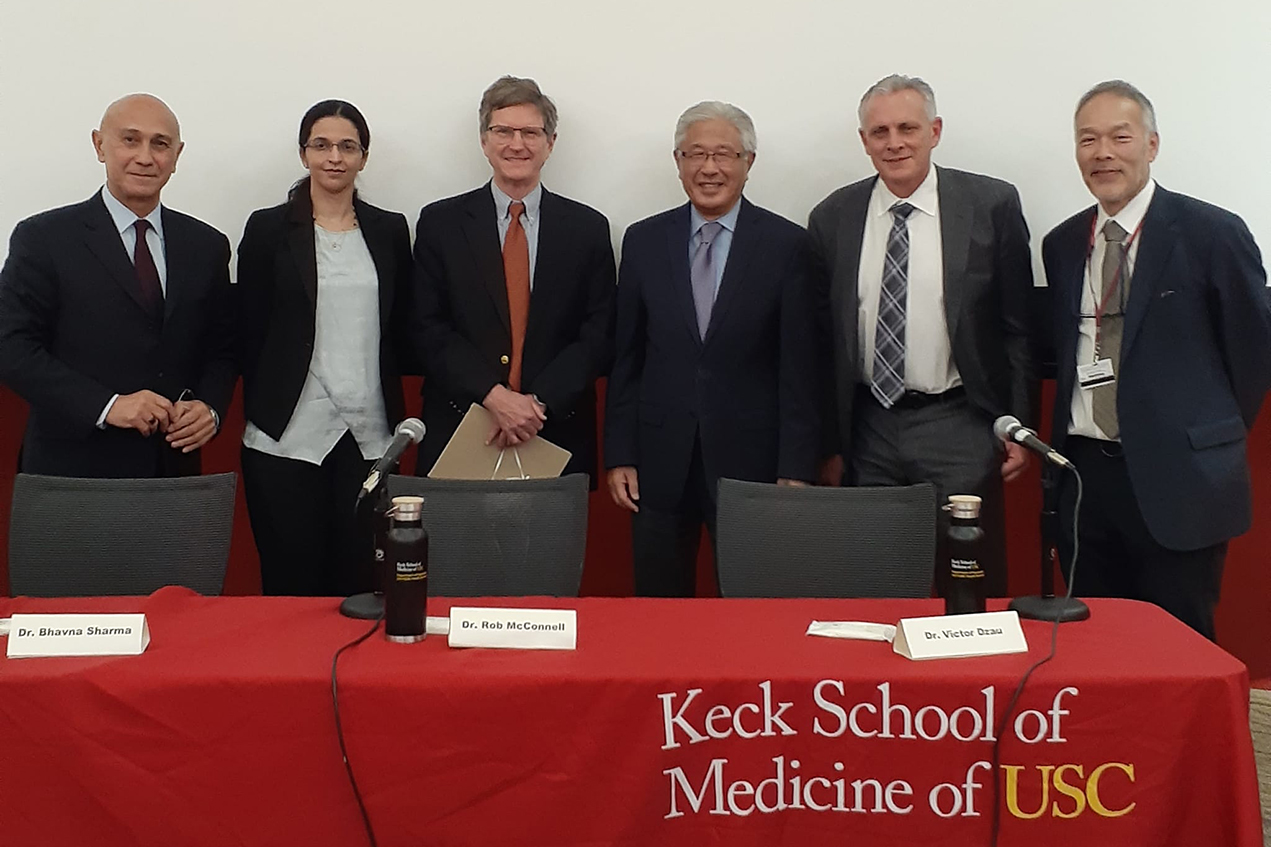On Nov. 29, Keck Medicine of USC continued its commitment to sustainability initiatives by welcoming Victor Dzau, MD, president of the National Academy of Medicine, to the Health Sciences Campus for a lecture titled, “Decarbonizing the Health Care Industry.” The event was part of a Grand Rounds in Population and Public Health Sciences and the Keck School of Medicine’s Dean’s Transformative Lecture series.
Speaking at Aresty Auditorium, Dr. Dzau, along with expert panelists from the Keck School, the USC School of Architecture and the Viterbi School of Engineering, discussed the current environmental footprint of the health care industry and how USC research is contributing to a more sustainable future. USC President Carol L. Folt, PhD, and Senior Vice President for Health Affairs Steven Shapiro, MD, were also in attendance.
“This was an incredible opportunity to learn what steps the National Academy of Medicine is taking to limit the industry’s environmental footprint, as well as to hear from our talented USC faculty and researchers,” said Howard Hu, MD, Flora L. Thornton Chair of the Department of Population and Public Health Sciences, who served as the moderator.
In the five months since USC announced Assignment: Earth, its all-encompassing sustainability framework, Keck Medicine has made significant strides in contributing to the university’s goal of being climate neutral by 2025.
This past June, Keck Medical Center of USC, which includes Keck Hospital of USC and USC Norris Cancer Hospital, signed the White House Health Care Sector Climate Pledge. The pledge — developed by the Department of Health and Human Services (HHS) — invites organizations to commit to lowering their greenhouse gas emissions and building more climate-resilient infrastructure.
To uphold this pledge, Keck Medical Center has developed a roadmap approach to climate neutrality for the Health Sciences Campus. Working with Arup, a global sustainable development consultancy firm, the medical center identified an all-electric pathway that would achieve net climate neutrality by 2035 in alignment with LADWP’s decarbonization commitment to produce carbon neutral electricity. At the present moment, the medical center is looking to implement low-cost sustainability measures with quick payback. These include partial electrification of buildings that have gas equipment, green power procurement, and carbon offsets.
To support the campus’ electric enhancement goals, Keck Medicine has also installed twenty eight Level-2 electric vehicle chargers and seven Level-3 electric vehicle chargers in the Keck Hospital Parking Structure. Additionally, eight Level-2 chargers have been installed at the HC2 facility and four Level-2 chargers have been installed at the HC4 facility. Level-2 chargers are the most common electric vehicle charger, and charge at a rate of 12-80 miles per hour, filling most electric vehicles within 4.5 hours. Level-3 chargers fill a battery at a rate of 75 – 1,200 miles per hour, filling most electric vehicles in 30 minutes.
“In the coming months, we will be scaling up our charging stations throughout the campus as EV demand increases,” said Jon Reuter, chief of operations at Keck Hospital. “Our medical enterprise is fully committed to sustainability efforts. As we achieve our climate neutral goals, we will not only be helping to support our dedicated caregivers, but all those seeking our help.”
Recently, the medical center has also prioritized sustainable nutrition and food systems. Some of the highlights include:
- Eliminating single-use plastic bottles in all of their retail outlets, and serving reusable glass and aluminum bottles.
- The Keck Hospital Café has switched over to sustainable packaging; sugar cane boxes, plates and bowls; Paper Simply for to-go boxes; and compostable cutlery.
- The Keck Hospital patient menu offers wild caught sustainable salmon, fresh organic salads and organic fruit.
For FY23, the medical center has a number of sustainability initiatives designed to further support its roadmap approach to climate neutrality. These include:
- Landscape Projects
- Introduce California native and drought-tolerant plants for the Keck Hospital and HC building driveways and entrances.
- LED Lighting Projects
- Install LED light fixtures in public spaces at USC Norris and the HC4 facility.
- Water Saving Projects
- Install laminar flow devices to achieve water savings at USC Norris, the HC1, HC2, and HC4 facilities.
Keck Medicine leadership also plans to introduce a green overhaul of operating room spaces within the medical center. For this goal, Keck Medical Center has partnered with Stryker’s Sustainability Solutions, a leading provider of reprocessing and remanufacturing services for single-use medical devices — the practice of inspecting, sterilizing and repackaging clinical devices so they can be safely used again.
Since partnering with Stryker, the medical center has also created a waste diversion pilot program in the main Keck Hospital operating room and hopes to transition from disposable to reusable isolation gowns as part of the initiative.
“This is only the beginning of our sustainability journey,” said Miguel Gonzalez, associate administrator of support services at Keck Medical Center. “Just as we heal those in need, so too must we be mindful of the health and well-being of our planet. We will continue with these efforts full force and look forward to further enhancing the climate infrastructure of our Health Sciences Campus.”
— Matthew Vasiliauskas


